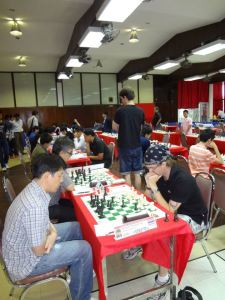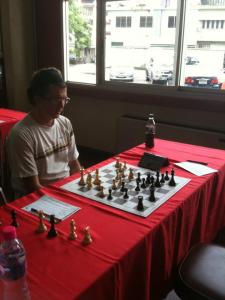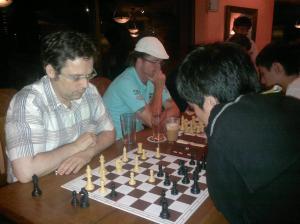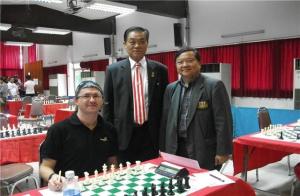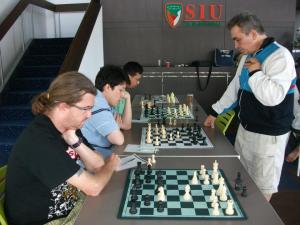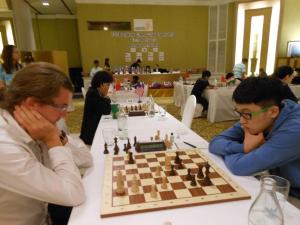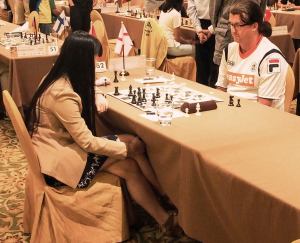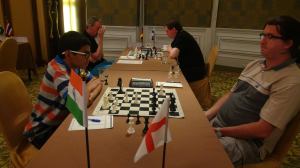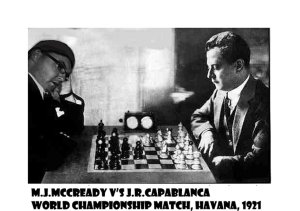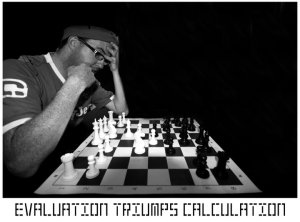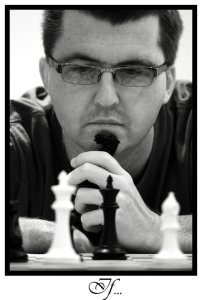John Lennon once said that French rock is like English wine. Would he be rocking if he read ‘The Modern French’ if he were still alive…well read on and decide for yourself.
They say you should never judge a book by its cover but surely the best way to know what a book is about, who wrote it or what the price is, is to look at the cover which tells us the text ‘The Modern French’ arrives courtesy of Antic (no not Raddy) and Maksimovic, who have teamed up with New In Chess. On the back cover, the text claims to ‘change your view of one of the most popular openings of all time’ – and no that’s not a daft attempt to sell a book, it is in fact a very daft attempt to sell a book. Literature in chess tends to lack the transformative capacity its impoverished authors & publishers tend to play up, so along with the bright red cover it was I who was initially ‘rocked’ upon receipt of this rather strangely bundled reading material. Also on the cover we see the words ‘A Complete Guide for Black’. Given that Carlsen has recently been lashing out with the Winawer, I thought I’d look up the lines he’s been playing. Imagine my surprise when I found it had been omitted from the text altogether, along with the also popular Burn and Rubinstein variations. What kind of ‘Complete Guide’ could this be, I asked myself? The title -also to be found on the cover oddly enough- claims that the book details ‘The Modern French’ yet upon perusal many of the lines covered are far from modern…I was indeed perplexed and felt compelled to read on, safe in the knowledge that any book on the French Defence simply must be a good read (yes you’ve guessed it, the author plays the French Defence too).
Start Right!
The Foreword (more about that to come) reads as follows ‘Over the intensive two-year effort of writing this book, the aim of the authors has been to present you with more than the traditional bone-dry analysis of all possible variations [?]. To this aim, apart from explaining the essential strategies and plans pertinent to this opening, we also cover a multitude of complex plans and theoretical novelties as part of our new strategic approach’. That’s a strange start. Those who write in a professional capacity don’t usually draw attention to a period of time as short as that, bearing in mind to get where you are usually involves research over periods far greater. Fifteen years or a lifetime of effort, okay now we are getting there but two years? That’s on a par with the your first post-grad qualification, what’s so exceptional about that? More crucially, for a number of reasons I will point to later, I don’t believe the text even constitutes two years of ‘intensive’ effort. I also don’t believe that the approach offered by the authors is particularly new either; ‘new’ for them maybe but only them. One text that does attempt to give a ‘bone-dry analysis’ and, in my opinion is what the authors are alluding to, is Lev Psakhis’ book ‘The Complete French’, but if this is the sort of thing they are trying to move away from it needs to be asked why they have copied/used the same format? Though successful attempts are made to summarize and highlight key positions throughout, originality or lack thereof pervades the text from start to finish on a number of levels. The text smells of a copied, but improved, version meaning that aspects of the text are misdescribed by the authors.
Once again from the Foreword: The French has been an integral part of many top players’ repertoires [but isn’t this true of most mainstream openings?], and it was the key weapon in the hands of old masters such as Botvinnik and contemporary stars such as Carlsen and Morozevich. When you look at their tournament results, it becomes clear that they chose the French Defence in important games, when they need to secure a win with the black pieces.’ What a load of old tosh, the sentence simply isn’t true -shame upon the editor. Carlsen does play the French but only occasionally and rarely in crucial games. Trying to over-emphasize the importance of the French Defence by construing language to suggest that its selection is habitual amongst certain top players is just another cheap sell. I don’t understand why the Foreword is used to try and sell you the book. It’s an unpersuasive start I must say. To conclude this section, I also don’t understand why the Winawer has been left out, if demonstrating how essential winning with the French is, then I suspect it’s omission tells us more about the book than anything else -the authors simply don’t play it.
What I definitely liked about this book.
1) It’s about the French Defence!
2) The analysis is, undoubtedly, the strong point of the book. It is sound throughout, as well as being easy to assimilate. A good balance has been found between range and depth of response with much quality annotation to boot.
3) I was personally happy to see that the authors dropped the tradition of starting with rare and unusual moves. I’ve always found retaining motivation to be an issue when you are forced to wade almost half-way into a book before anything familiar emerges. I was also happy to see that chapters are finishing with concluding remarks. Though perhaps more could be said, the remarks do tie in well with the content, helping those of us who are less gifted.
What I definitely didn’t like about this book
1) Attention to detail is lacking in places. A foreword is only a foreword when its written by someone else and not when its written by the authors of the book. That’s what we’ve called a preface for the last several hundred years. The game on pages 58 & 59 isn’t referenced properly. It reads Schebler-Art. Minasian, Kalithea 2008. Since I know GM Schebler, I asked him about this. He informed me that his opponent was named Artashes Minasian, and not Art. The punctuation denotes abbreviation but given the spacing, I wasn’t sure whether Minasian was part of his name or a place, it is unclear in the text.
2) Some attempts to infuse modernity or provide context are crude and inexact. For example, pg 59: ‘3. e5 is regarded as the third strongest move, [justification?] after 3.Nc3 and Nd2. The recent tournament practice confirms this assessment.’ Poor English and vague, unsupported statements here. ‘When it comes to old masters, the biggest fans of the advance variation, Nimzowitch and Paulsen, provided the biggest theoretical advances. Later on, a number of top players, adopted this variation as part of their regular repertoire [the correct connotation is main repertoire]. You couldn’t make this stuff up, and I am supposed to believe this book constitutes a two-year intensive effort? This is just another example of crap writing in chess.
3) The concept of the book lacks refinement. The format of the book is so similar to Psakhis’ ‘The Complete French’ I did expect it to be in the wafer-thin bibliography but its not there. I find that to be rather suspicious. Also missing is Nigel Short’s book, and Shaun Taulbut’s, both of which are essential reading for the French. More importantly, the handling of the Tarrasch is somewhat idiosyncratic. We are only offered Morozevich’s 3…Be7. All it needs is for someone else to come over the top with more concrete analysis showing exactly what is wrong with the response 3. Be7 (though the authors seem to know already), and the entire chapter will be rendered obsolete. Sounder 3rd moves clearly exist, Nf6 and c5 spring to mind and should have been offered. Though 3. Be7 is a modern move, and thus fits in with the overall aim of the book soundness cannot be sacrificed for the sake of modernity. In offering more third move alternatives, at least the authors would have a get out of jail free card to play if 3 Be7 does not stand the test of time. Some of the positions shown, particularly where white plays 4. e5 & 5. Qg4 require a horrendous level of precision if black is to avoid being wiped out early on…I for one certainly won’t be playing them. The poor exposition of the Tarrasch reveals the limitations of the book more clearly than anywhere else. The reader has little choice other than to follow the authors down a precipitous path, the option of an alternative route would have been a more pragmatic decision in the pre-writing phase.
When I studied at post-grad level, I was taught by one of my professors that in order to write about something, you need to define what it is first. So what is the modern French? We simply don’t know because the question doesn’t arise. What does modern mean? Post-Kasparov? I don’t know. Confusingly, I noticed John Watson in the reading list, who is one of the few authors in chess that can document development in chess successfully, but why can’t the authors reference his work and inform the reader since he is in the bibliography? We are presented with an array of carefully indexed modern games, but that is just exposition. No effort is made to state whether the line being played is modern -often not the case in the text- and in what sense it is modern. Why are certain moves defined by modernity? Too little is said.
What I think the title alludes to is a modernized text on the French. Questions can be asked over why we have both the Steinitz and the McCutcheon in the book when the Winawer can replace both. If the McCutcheon is so great, then perhaps the authors would like to explain why it is virtually non-existent at the highest level? Again, this ‘Complete Guide’ is complete in the sense that it fulfils the authors impartation of their own preferences, whether they have homed in on relatively unexplored, modern lines solely to create strong marketing points or to substantiate their own analysis is a question only they can answer, the answer lies somewhere between the two I suspect.
4) Given that the book aims to provide key positions and structures, as part of its successful attempt to offer an in-depth look at the french, why are we denied, middle and endgames? Surely its crucial to see how the strategic motives are played out, seeing that such value is placed upon them? Annotation would be useful but not necessary. The authors could have given you the option of playing through the game yourself without having to go on line.
A Conclusion
I’m not sure what John Lennon would have made of this book, I think he would have said it hummed rather than rocked. But seriously, I think ‘The Modern French’ has greater strengths than weaknesses but will never be considered to be a classic, as there is too much room for improvement in it. The content is at times superficial and at others in-depth and highly informative. We are never freed from its erratic twists and turns, which probably comes down to a lack of writing credentials more than anything else. How else can we interpret the total lack of originality in the format and style of the book as constituting anything other than a lack writing craft? It is true that improvements have been made if you compare the work to Psarkis’ but they are not sufficient in themselves. The analysis is sound and impressive but just about everything else is sloppy and imprecise. There is a strong tendency in chess to copy or base your work previous publications, ‘The Modern French’ disappointingly fits into that tradition in my opinion.
Anyway, that’s just my take on things. I stand to be corrected as always.












